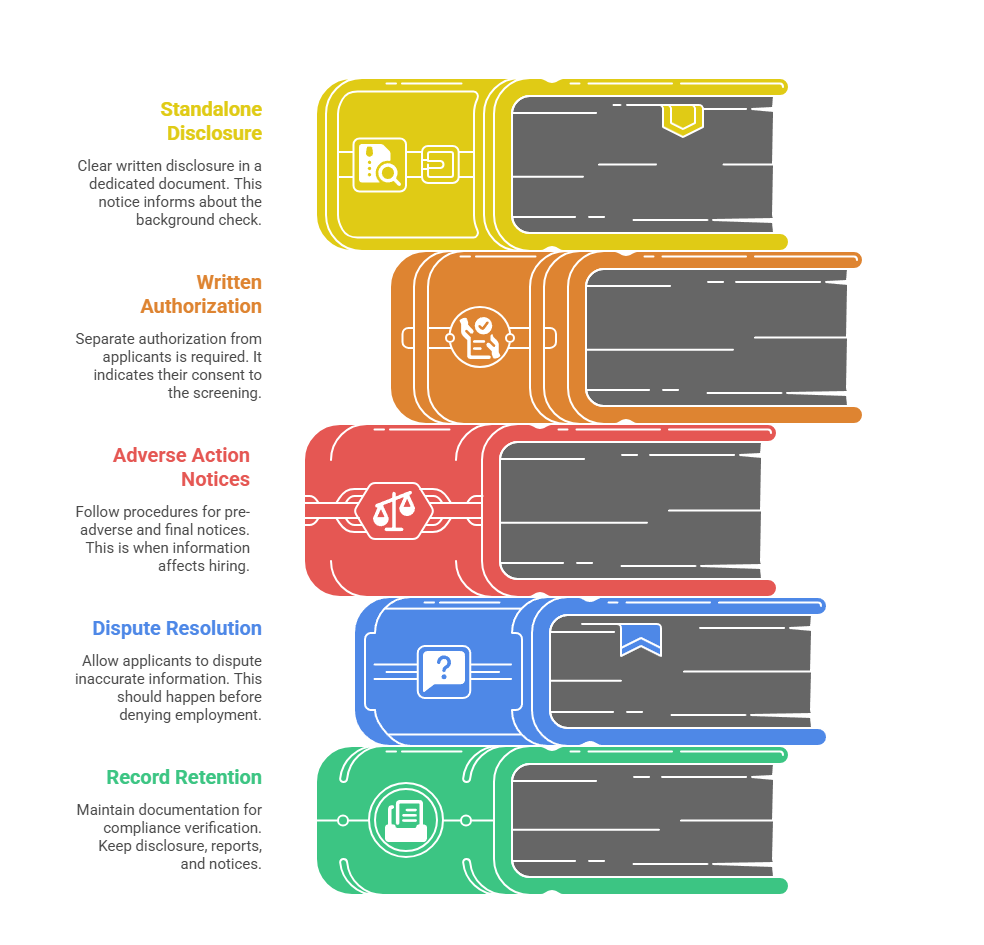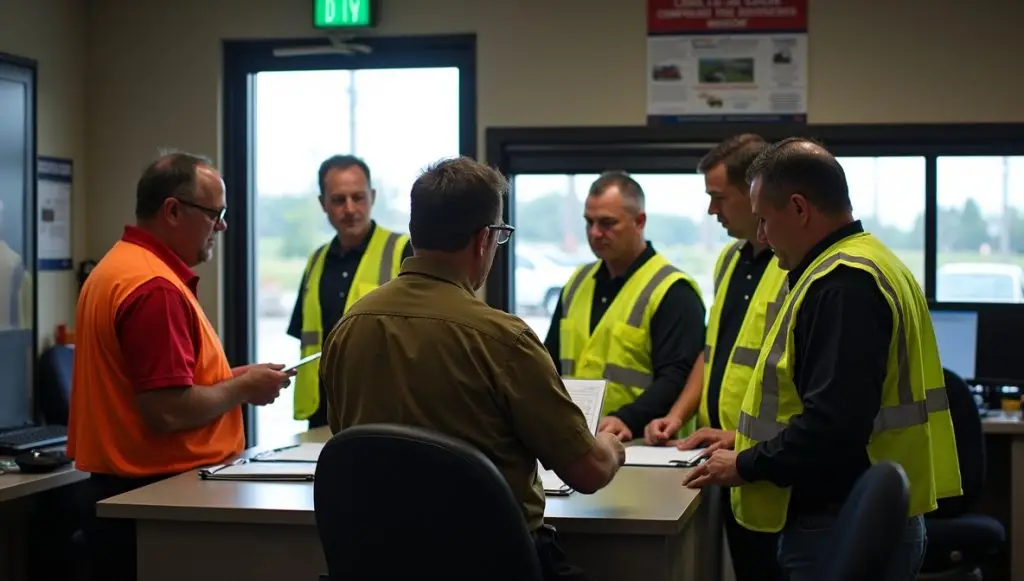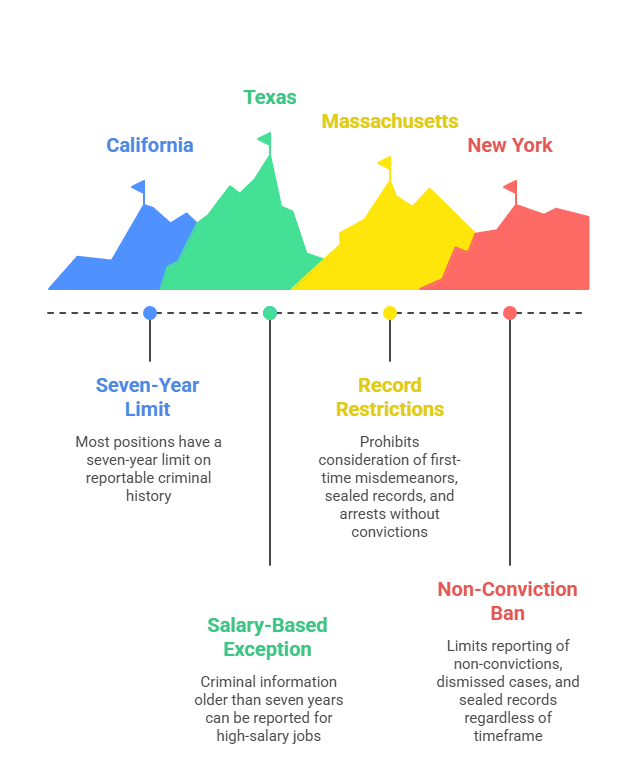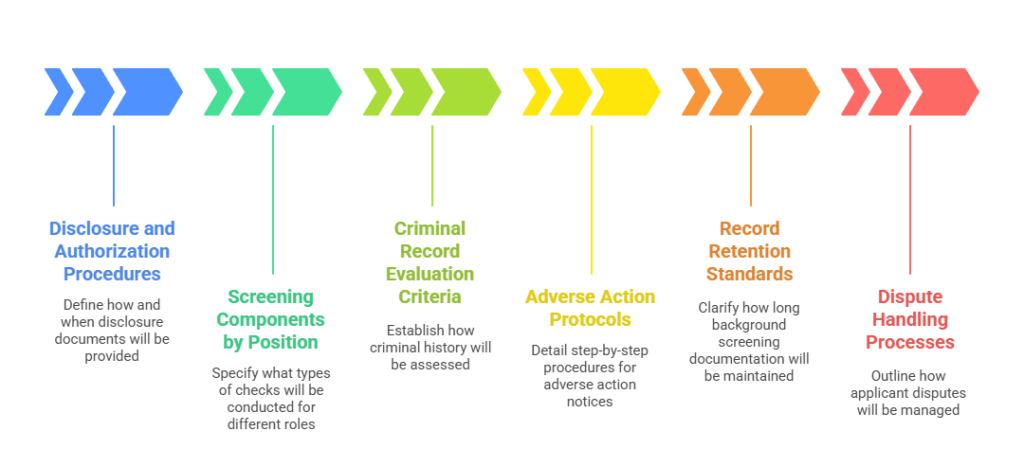Transportation and logistics companies face a unique compliance challenge at the intersection of FCRA regulations and DOT/FMCSA safety requirements. Mistakes in background screening can trigger penalties from multiple federal agencies. This guide explains how trucking and fleet management companies can maintain FCRA compliance while meeting strict pre-employment screening standards.
Key Takeaways
- FCRA compliance for trucking companies requires coordination between fair credit reporting laws and DOT safety regulations, with violations carrying penalties up to $5,000 per incident plus potential DOT sanctions.
- Transportation employers must provide separate FCRA disclosure documents before conducting background checks, distinct from employment applications or other hiring paperwork.
- Adverse action procedures require specific notice timelines when denying employment based on background check results, including pre-adverse and final adverse action letters with required waiting periods.
- DOT pre-employment screening standards mandate specific checks including PSP reports, drug testing clearinghouse queries, and employment verification that must align with FCRA authorization requirements.
- The seven-year reporting limit under FCRA applies differently to transportation positions, with DOT regulations sometimes requiring longer lookback periods for safety-sensitive roles.
- Small transportation companies face the same FCRA obligations as large carriers, with no exceptions based on fleet size or number of employees.
- Third-party background screening vendors used by logistics companies must be FCRA-compliant Consumer Reporting Agencies, with transportation employers remaining liable for vendor violations.
- Individualized assessments of criminal records help transportation employers balance EEOC guidance with DOT safety requirements while maintaining FCRA compliance.
Understanding FCRA Requirements in the Transportation Industry
The Fair Credit Reporting Act governs how transportation and logistics companies obtain and use background information for hiring decisions. Furthermore, it creates specific obligations that intersect with DOT safety regulations. Congress enacted FCRA in 1970 to promote accuracy, fairness, and privacy of information in consumer reporting agency files. Over time, amendments have strengthened protections for job applicants. For trucking companies and fleet operators, FCRA compliance isn't optional. Instead, it's a federal requirement that applies regardless of company size or screening frequency.
Transportation companies must understand that FCRA treats background checks as "consumer reports" when used for employment purposes. As a result, this triggers specific disclosure and authorization requirements before screening begins. The law applies to information obtained from third-party Consumer Reporting Agencies (CRAs). However, it doesn't apply to verifications conducted directly by employers. This distinction matters significantly in transportation hiring because companies often combine CRA-provided background checks with direct DOT-mandated verifications.
What FCRA Covers for Transportation Employers
FCRA regulates the collection and use of consumer information for employment decisions. Specifically, this includes criminal records, credit reports, driving records, employment history, and verification of credentials. Transportation industry background check compliance requires understanding which screening activities fall under FCRA versus which are governed solely by DOT regulations.
The act covers background checks obtained through third-party screening companies. On the other hand, it doesn't apply to information gathered directly by employers through their own investigations. For logistics companies, this means FCRA governs most pre-employment background screenings. Meanwhile, some DOT-required verifications may fall outside FCRA when conducted directly. Understanding this distinction prevents compliance gaps that could expose companies to liability.
Key FCRA Obligations for Trucking Companies
Transportation employers must navigate several critical compliance requirements when conducting background checks on job applicants. In particular, FCRA establishes specific procedural safeguards that protect applicant rights while allowing employers to make informed hiring decisions. These obligations apply to all transportation companies regardless of size.

- Standalone Disclosure: Provide clear, written disclosure in a document consisting solely of the notice that a background check will be conducted
- Written Authorization: Obtain separate authorization from applicants clearly indicating consent to the background screening process
- Adverse Action Notices: Follow complete pre-adverse and final adverse action procedures when background information negatively influences hiring decisions
- Dispute Resolution: Allow applicants reasonable opportunity to dispute inaccurate information before finalizing employment denials
- Record Retention: Maintain documentation of disclosure, authorization, background reports, and adverse action notices for compliance verification
Consequently, fleet management FCRA best practices include using standardized disclosure and authorization forms reviewed by legal counsel. This ensures compliance with current FCRA requirements and relevant state laws.
DOT-Specific Background Screening Requirements
The Department of Transportation and Federal Motor Carrier Safety Administration impose mandatory pre-employment screening requirements on motor carriers. Moreover, these requirements operate alongside FCRA obligations. DOT pre-employment screening standards exist to ensure highway safety by preventing unqualified drivers from operating commercial motor vehicles. Therefore, transportation companies must integrate these DOT requirements with FCRA compliance procedures. The result is a complete screening process that satisfies both regulatory frameworks.
FMCSA regulations require motor carriers to conduct specific investigations of driver applicants' backgrounds. These include verification of employment history, road testing, and reviewing driving records from all states where the applicant held licenses. Additionally, these DOT-mandated checks must occur before allowing drivers to operate commercial vehicles. This creates tight timelines that transportation employers must manage carefully.
Pre-Employment Screening Program (PSP) Requirements
The FMCSA's Pre-Employment Screening Program provides motor carriers with electronic access to driver safety data. This includes five years of crash data and three years of roadside inspection history. Transportation company hiring compliance increasingly includes PSP reports as a standard screening component. Nevertheless, FMCSA doesn't explicitly require their use. When obtained through third-party screening vendors, PSP reports constitute consumer reports under FCRA. Thus, this requires proper disclosure and authorization.
PSP reports provide critical safety information that helps carriers assess driver qualifications. The program allows carriers to view a driver's crash involvement and inspection history before making hiring decisions. Therefore, transportation employers using PSP reports must treat them as FCRA-covered consumer reports. This means providing applicable notices and following adverse action procedures if PSP information influences hiring decisions negatively.
Drug and Alcohol Clearinghouse Queries
DOT's Drug and Alcohol Clearinghouse, implemented in January 2020, requires motor carriers to conduct electronic queries before permitting drivers to operate commercial vehicles. The clearinghouse contains records of DOT drug and alcohol program violations. These include positive tests, refusals to test, and completion of return-to-duty processes. Specifically, carriers must conduct full queries during pre-employment screening and limited queries annually for current employees.
Clearinghouse queries represent a unique intersection of DOT safety requirements and privacy protections. Importantly, they fall outside traditional FCRA coverage since employers query the database directly. However, transportation employers must still obtain driver consent before conducting pre-employment full queries. Fleet management FCRA best practices include integrating clearinghouse authorization with FCRA disclosure documents. Consequently, this streamlines the driver application process while maintaining separate compliance with each requirement.
Employment History Verification Standards
FMCSA regulations mandate that motor carriers investigate driver employment history for the preceding three years. In fact, carriers must contact all previous DOT-regulated employers directly. This requirement exists to uncover patterns of safety violations, failed drug tests, or other disqualifying issues. The regulation specifies that carriers must make all reasonable efforts to contact previous employers and document these efforts.
When transportation companies use third-party vendors to assist with employment verification, these verifications may constitute consumer reports under FCRA. This creates overlapping compliance obligations. Employers must satisfy both DOT's specific verification requirements and FCRA's accuracy procedures. Therefore, logistics company background screening policies should clearly define how employment verification will be conducted.
The FCRA Adverse Action Process for Transportation Employers

Adverse action procedures represent critical FCRA compliance obligations that transportation companies must follow. FCRA defines adverse action broadly to include denying employment, rescinding job offers, or taking other actions unfavorable to applicants. Trucking industry adverse action requirements operate on specific timelines with mandatory documentation. As a result, this creates compliance checkpoints that transportation HR teams must execute precisely.
The adverse action process serves to give applicants an opportunity to review background check information. They can identify errors and dispute inaccurate data before final employment decisions become final. For transportation employers, these procedures apply whether the disqualifying information comes from criminal records, driving history, or employment verification. Understanding that adverse action obligations exist separate from DOT disqualification requirements helps companies avoid conflating different regulatory frameworks.
Pre-Adverse Action Requirements
Before taking adverse action based on background check information, transportation employers must provide applicants with a pre-adverse action notice. This notice must include a copy of the consumer report and a copy of "A Summary of Your Rights Under the Fair Credit Reporting Act." Consequently, this notification gives applicants the opportunity to review the information and dispute inaccuracies before the employer makes a final decision.
Transportation companies should provide pre-adverse action notices promptly after identifying disqualifying information. This starts the clock on the waiting period. Best practices include sending these notices via methods that create delivery confirmation. Fleet managers must resist pressure to accelerate hiring timelines by skipping pre-adverse action waiting periods. Ultimately, FCRA violations can result in significant penalties far exceeding the convenience of faster hiring.
Reasonable Waiting Period Requirements
FCRA requires employers to provide applicants "reasonable" time to respond to pre-adverse action notices. While FCRA doesn't specify exact waiting periods, the Federal Trade Commission has indicated that five business days generally qualifies as reasonable. Nevertheless, circumstances may warrant longer periods. Transportation employers should establish consistent waiting periods that provide genuine opportunity for applicants to dispute information.
During the waiting period, applicants may contact the background screening company to dispute inaccurate information. Transportation companies should designate clear points of contact for applicants to submit disputes. If applicants dispute background check accuracy, employers should pause adverse action pending reinvestigation. The CRA must respond within 30 days under FCRA's dispute resolution procedures.
Final Adverse Action Notice
After the reasonable waiting period expires, if the transportation employer decides to proceed with adverse action, FCRA requires a final adverse action notice. This notice must inform applicants that the adverse action has been taken. Additionally, it must identify the consumer reporting agency that provided the background report. The notice must also clarify that the CRA didn't make the employment decision.
| Notice Component | Required Information | Purpose |
| Action Taken | Clear statement that employment was denied | Confirms final decision |
| CRA Identification | Name, address, phone of screening company | Directs disputes to proper party |
| CRA Role Clarification | Statement that CRA didn't make decision | Protects CRA from liability |
| Applicant Rights | Free report copy and dispute information | Enables error correction |
Fleet management FCRA best practices include maintaining documentation of all adverse action notices. Transportation employers should train HR staff on adverse action procedures and consider using automated compliance systems. These systematic approaches reduce the risk of procedural errors.
State-Specific Transportation Background Check Laws
Transportation and logistics companies operating across multiple states must navigate a complex patchwork of state laws. Many states have enacted "ban the box" laws restricting when employers can inquire about criminal history. Others have laws limiting how far back background checks can look. Logistics company background screening policies must account for the most restrictive applicable law to ensure full compliance.
State law variations create particular complexity for interstate motor carriers whose hiring processes cross jurisdictional boundaries. Companies must determine which states' laws apply to their screening practices. Generally, laws where the employer is located, where the applicant resides, and where the position will be performed may all claim applicability.
Criminal Record Reporting Limitations
Over thirty states have enacted laws limiting how far back criminal background checks can report convictions or arrests. Many impose seven-year limits that align with or differ from federal FCRA provisions. Transportation employers face varying requirements across jurisdictions:

- California: Seven-year limit applies to most positions, though exemptions exist for certain jobs
- Texas: Restricts reporting of criminal information more than seven years old, with exceptions for positions with annual salaries exceeding $75,000
- Massachusetts: Prohibits consideration of first-time misdemeanor convictions, sealed records, and arrests not resulting in convictions
- New York: Limits reporting of non-convictions, dismissed cases, and sealed records regardless of timeframe
These state variations require transportation employers to configure background checks based on where applicants live. Fleet management FCRA best practices include working with background screening vendors who understand state-specific reporting limits.
Ban the Box and Fair Chance Laws
"Ban the box" laws prohibit employers from inquiring about criminal history on initial employment applications. They delay such inquiries until later in the hiring process. Over thirty-five states and over 150 cities have enacted various forms of ban the box legislation. These laws aim to give applicants with criminal histories an opportunity to be considered based on qualifications first.
For transportation employers, ban the box laws create timing challenges with DOT requirements. Companies must structure hiring processes to comply with ban the box laws while still completing required DOT investigations. This typically involves extending conditional offers before criminal background checks. Then, conducting all screening before finalizing employment and permitting vehicle operation.
Working with Consumer Reporting Agencies
Transportation and logistics companies typically partner with third-party Consumer Reporting Agencies to conduct background screenings. FCRA defines CRAs as entities that assemble or evaluate consumer information for the purpose of furnishing consumer reports to third parties. Selecting FCRA-compliant background screening vendors is critical. Transportation employers remain legally responsible for FCRA violations even when caused by their vendors' errors.
The relationship between transportation employers and CRAs involves shared compliance responsibilities. Employers must provide proper disclosure and authorization, make compliant employment decisions, and follow adverse action procedures. CRAs must maintain reasonable procedures to ensure maximum possible accuracy of information they report.
Selecting Qualified Background Screening Vendors
Transportation companies should carefully evaluate potential Consumer Reporting Agency partners. The right vendor relationship protects companies from compliance failures while streamlining the hiring process. Qualified vendors understand how DOT-specific requirements like PSP reports integrate with traditional background screening elements.
- FCRA Compliance History: Review whether the CRA has faced enforcement actions related to FCRA violations
- Transportation Industry Experience: Assess vendor familiarity with DOT requirements and transportation-specific screening needs
- Technology Integration: Evaluate whether vendor systems integrate with applicant tracking systems
- Accuracy Procedures: Understand what processes the vendor uses to verify information accuracy
- Turnaround Times: Confirm typical completion timelines align with transportation hiring needs
- Customer Support: Assess availability of compliance guidance and dispute resolution support
- Pricing Transparency: Ensure clear understanding of costs for different screening packages
Due diligence in vendor selection protects transportation employers from compliance issues. Fleet operators should request and review vendor compliance documentation.
Vendor Management and Ongoing Oversight
After selecting a background screening vendor, transportation companies should implement ongoing oversight. This includes periodic audits of vendor performance and review of accuracy metrics. Transportation employers should establish service level agreements that define expected vendor performance. These agreements create accountability for compliance failures.
Regular communication with CRA partners helps transportation employers stay informed about regulatory changes. Vendors should proactively notify clients about FCRA amendments or new DOT requirements. This partnership approach supports continuous compliance improvement.
Common FCRA Compliance Mistakes in Transportation Hiring
Transportation and logistics companies frequently make preventable FCRA compliance errors. Understanding these common mistakes helps fleet managers implement systems that avoid violations. Many FCRA violations result from misunderstanding requirements, inadequate training, or failure to update procedures. The Federal Trade Commission, Consumer Financial Protection Bureau, and private litigation enforce FCRA compliance. Penalties range from actual damages to statutory damages of $100-$1,000 per violation plus attorney's fees.
These enforcement mechanisms create strong incentives for proactive compliance. Transportation employers who invest in proper procedures significantly reduce their risk of costly violations.
Disclosure and Authorization Errors
The most frequent FCRA violation in transportation hiring involves improper disclosure and authorization documents. Companies commonly embed disclosure language within employment applications. FCRA requires disclosure to be "clear and conspicuous" and in a document consisting "solely of the disclosure."
Transportation employers must provide standalone disclosure documents that clearly inform applicants a background check will be conducted. After providing disclosure, companies should obtain separate written authorization from applicants. Using standardized forms reviewed by legal counsel helps ensure consistent compliance.
Adverse Action Procedure Failures
Transportation companies frequently fail to follow complete adverse action procedures. Hiring managers under pressure to fill driver vacancies quickly may skip pre-adverse action steps. This procedural shortcut violates FCRA's requirement to give applicants opportunity to dispute inaccurate information.
Another common mistake involves incomplete adverse action notices that omit required information. Transportation employers should use checklist systems or automated tools to ensure all adverse action procedure steps are completed. These systematic approaches prevent procedural oversights.
Misunderstanding the Seven-Year Reporting Limitation
FCRA's seven-year reporting limit restricts how far back certain information can be reported. This includes civil suits, civil judgments, arrests, and paid tax liens. Many transportation employers misunderstand this limit. They believe it prevents them from considering any information more than seven years old.
The seven-year limit contains important exceptions. Criminal convictions can be reported indefinitely under federal FCRA. Additionally, the seven-year clock starts from different dates depending on information type. Transportation employers should work with background screening vendors who understand these nuances.
Building Compliant Transportation Background Screening Programs
Creating complete background screening programs requires intentional policy development. Transportation companies should establish written background check policies. These should define what screening will be conducted, when it will occur, how information will be evaluated, and what procedures will be followed. These written policies create consistency and demonstrate good-faith compliance efforts.
Effective screening programs balance thorough investigation of applicant backgrounds with respect for applicant rights. For transportation employers, this means integrating FCRA-compliant procedures with DOT-required verifications. The investment in building compliant programs pays dividends through reduced legal risk and better-quality hires.
Policy Development and Documentation
Transportation companies must develop written policies that address every aspect of their background screening program. These policies serve as operational blueprints while demonstrating commitment to compliance. Well-crafted policies acknowledge both FCRA requirements and DOT/FMCSA regulations.

- Disclosure and Authorization Procedures: Define how and when disclosure documents will be provided
- Screening Components by Position: Specify what types of checks will be conducted for different roles
- Criminal Record Evaluation Criteria: Establish how criminal history will be assessed
- Adverse Action Protocols: Detail step-by-step procedures for adverse action notices
- Record Retention Standards: Clarify how long background screening documentation will be maintained
- Dispute Handling Processes: Outline how applicant disputes will be managed
These policies should be reviewed by legal counsel and updated regularly. Documentation practices are equally critical, with employers maintaining copies of all disclosure documents, signed authorizations, and background reports.
Training HR Staff and Hiring Managers
Even excellent policies fail without proper implementation. Transportation companies should provide training to HR staff, hiring managers, and anyone involved in background screening processes. Training should cover FCRA requirements, DOT screening obligations, and proper use of disclosure forms.
Regular refresher training ensures staff stays current with regulatory changes. Transportation employers should document all compliance training. This documentation demonstrates good-faith compliance efforts. Fleet management FCRA best practices include making compliance training part of onboarding for new HR staff.
FCRA Compliance and Ongoing Employment Decisions
FCRA applies not only to pre-employment background checks but also to screenings conducted on current employees. Transportation companies that conduct periodic background checks on current drivers must follow FCRA procedures. This creates ongoing compliance obligations beyond initial hiring.
Some transportation employers mistakenly believe that obtaining authorization during initial hiring covers all future background checks. This is incorrect. FCRA generally requires new disclosure and authorization before each separate background check. However, the authorization can cover a defined time period if properly worded.
Periodic Re-Screening of Drivers
Motor carriers commonly conduct annual or periodic re-screening of drivers. They check for new criminal convictions, license suspensions, or other disqualifying issues. DOT requires annual review of drivers' motor vehicle records. When these re-screenings involve consumer reports from third-party CRAs, FCRA requirements apply.
Best practices include obtaining comprehensive authorizations during initial hiring that cover periodic re-screening. Transportation employers should provide updated disclosures if screening practices change. When periodic re-screening reveals adverse information, companies must follow full adverse action procedures. This applies even for long-term employees.
Conclusion
FCRA compliance for trucking companies requires understanding complex intersections between fair credit reporting laws and DOT safety regulations. Transportation employers must implement complete screening programs that provide proper disclosure, obtain clear authorization, and follow adverse action procedures. While these requirements add procedural steps to hiring, they protect both applicant rights and employer interests. Investing in robust compliance programs positions transportation companies for regulatory confidence and reduced liability.
Frequently Asked Questions
What is the penalty for FCRA violations in transportation hiring?
FCRA violations can result in actual damages and statutory damages of $100 to $1,000 per violation. Additionally, willful violations may lead to punitive damages and attorney's fees. Some transportation companies have faced multi-million dollar class action settlements for systemic compliance failures.
Do small trucking companies need to comply with FCRA?
Yes, FCRA compliance requirements apply to all transportation employers regardless of fleet size. There is no small business exemption for companies conducting background checks through third-party consumer reporting agencies. Even single-truck owner-operators who hire drivers must follow FCRA procedures.
How does FCRA interact with DOT background check requirements?
FCRA governs the process of obtaining and using background information. Meanwhile, DOT regulations specify what information must be obtained for safety purposes. Transportation employers must satisfy both frameworks through integrated screening procedures. Some DOT-required checks fall under FCRA when obtained through third-party vendors.
Can transportation companies use PSP reports without following FCRA procedures?
PSP reports obtained through third-party background screening vendors constitute consumer reports under FCRA. Therefore, they require proper disclosure, authorization, and adverse action procedures. However, reports obtained directly from the FMCSA system may fall outside FCRA coverage.
What makes a disclosure document FCRA-compliant for transportation hiring?
A compliant disclosure must be clear, conspicuous, in writing, and in a document consisting solely of the disclosure. It must inform applicants that a background check will be obtained. Employers should not include liability waivers or application questions that could invalidate the disclosure.
How long must transportation employers wait during the adverse action process?
FCRA requires a "reasonable" waiting period after providing pre-adverse action notice. Five business days is generally considered reasonable. However, circumstances may warrant longer periods. Transportation employers should establish consistent waiting periods that provide genuine opportunity for response.
Are criminal convictions subject to the seven-year FCRA reporting limitation?
Federal FCRA allows criminal convictions to be reported indefinitely. However, some state laws impose their own restrictions that transportation employers must follow. The seven-year limit under federal FCRA applies to civil suits, civil judgments, arrests, and paid tax liens.
Do transportation companies need new authorization for each background check on employees?
FCRA generally requires disclosure and authorization before each background check. However, properly worded authorizations can cover multiple reports over a defined time period. Transportation employers conducting periodic re-screening should obtain comprehensive authorizations during initial hiring.
Additional Resources
- A Summary of Your Rights Under the Fair Credit Reporting Act - Federal Trade Commission
https://www.ftc.gov/legal-library/browse/statutes/fair-credit-reporting-act - FMCSA Pre-Employment Screening Program (PSP) Information
https://www.fmcsa.dot.gov/safety/data-and-statistics/pre-employment-screening-program-psp - Drug and Alcohol Clearinghouse for Employers - Federal Motor Carrier Safety Administration
https://clearinghouse.fmcsa.dot.gov/ - Background Checks: What Employers Need to Know - U.S. Equal Employment Opportunity Commission
https://www.eeoc.gov/laws/guidance/background-checks-what-employers-need-know - Using Consumer Reports for Employment Purposes - Federal Trade Commission Business Guidance
https://www.ftc.gov/business-guidance/resources/using-consumer-reports-what-employers-need-know

GCheck Editorial Team
Meet the GCheck Editorial Team, your trusted source for insightful and up-to-date information in the world of employment background checks. Committed to delivering the latest trends, best practices, and industry insights, our team is dedicated to keeping you informed.
With a passion for ensuring accuracy, compliance, and efficiency in background screening, we are your go-to experts in the field. Stay tuned for our comprehensive articles, guides, and analysis, designed to empower businesses and individuals with the knowledge they need to make informed decisions.
At GCheck, we're here to guide you through the complexities of background checks, every step of the way.





